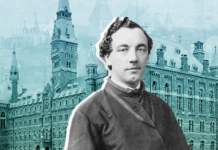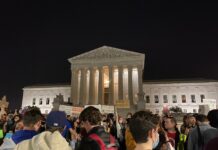![]()
Editor’s Note: The below article is a speech by the author delivered at the Philodemic Society’s September 1, 2022 meeting. It is the wish of the author to digitally preserve his writing and the composition of “The Philodemic Grand March” within the Georgetown Review. The speech was edited for length and clarity.
The induction process of Georgetown’s Philodemic Society is an introspective and exhilarating event for its incoming members. Through unscripted floor speeches, an aspiring Philodemician gains courage, rhetorical skills, and exposure to the operations of the Society. Through mentorship, one gains camaraderie within the Society’s upper ranks, as well as intangible social stratification. However, the guide of the Society’s history, passed from mentor to mentee in an unmarked manila folder, passes by new Philodemicians surreptitiously.
When I received my packet, one line discussing Philodemicians’ participation in a 19th century patriotic celebration in Southern Maryland particularly stood out: “At this event, Philodemicians could expect to hear ‘The Philodemic March,’ composed specifically for us in 1854 by Pedro A. Duanas.” Another inconspicuous line in an inconspicuous text at first glance, but to this musician of ten years, the premise of a composition made specifically for the Society was a tantalizing idea.
I first set out to find Pedro Duanas’s composition within the archives of various universities. After a fair amount of exploration, I discovered the piano piece in its 1854 composition in the Lester S. Levy Sheet Music Collection at Johns Hopkins University. As a saxophonist, I was unable to interpret the piece myself, so in order to make it readable to a computer and 21st century eyes, I employed the help of my friend Samuel Lovell (COL ‘25), who manually recreated the piece via Musescore. Despite the relative ease in recreating Duanas’ composition, I did not expect the profound story I uncovered that was attached to this sixty-three measure, two and a half minute composition.
Beginning in 1842, the Jesuits of Maryland, the Philodemic Society, and students at Mt. St. Mary’s College in southern Maryland participated in “The Commemoration of the Landing of the Pilgrims in Maryland,” hosted every few years in St. Mary’s City. Philodemicians were tasked with creating festive events for cityfolk, which expanded into elaborate displays of Catholic and American pride. According to research conducted by Georgetown alumnus Daniel F. Rendleman (COL ‘09): “It was a huge event, lasting several days and was repeated every few years. Eventually it involved multiple steamboats, large processions, and the Archbishop of Baltimore. It was, in essence, a celebration of the Catholic element of America’s founding, the melding together of Georgetown’s patriotism and Catholic faith.”
From 1850 to 1855, Pedro A. Duanas, a Spanish immigrant and layman, began work as Georgetown’s Professor of Music and chief organist. Duanas was a musician of distinction, founding the University’s first student band known as the “Philharmonic Society,” and securing instruments for the budding music program. Aside from his duties, Duanas was a prolific composer, producing numerous pieces honoring Georgetown students, the ladies of Georgetown Visitation,” and his pièce de résistance: the Philodemic Society with his grand march. Composed in 1854, Duanas gifted the composition to the Philodemic Society, believing that the study and performance of music sharpened one’s rhetorical skills. The Society included his composition in commemoration events in St. Mary’s City well into the nineteenth century, participating until the Maryland state government recommissioned these festivities under Maryland Day in 1916.
Unequivocally, Philodemic’s pursuit of “eloquence in the defense of liberty” is not an abstract concept, because those who engage with our Society possess the freedom to express themselves in a variety of ways. Music is an excellent example of this eloquence as a conduit for expression, since many of its features can be applied to the debates of our Society. Exposure to different cadences and rhythms can fine-tune speech patterns, improving speech structure. Technical aspects such as the time signature, volume, and pitch of voice can augment pacing and listening quality. And most importantly, the lyrical nature of pieces like the “Philodemic Grand March” intensify contemplation and bolster historical understanding.
As I reflect on my induction, I recognize that the Philodemic Society is at its core a political and philosophical debating society: diligent in improving its members’ oratory talents, but also reaching consensus on hot-button issues and bettering the communities and nations in which we dwell. Our current membership spans all five undergraduate schools, whose eclectic involvement in academic and professional pursuits expand and intensify our debates. Two centuries of Philodemic alumni have produced not just great speakers, but profound lawyers, journalists, doctors, academics, activists, and theologians. It was Philodemicians who gathered thrice under blue and gray to reinvigorate the Society and rebuild the nation. It was Philodemicians who worked to maintain Georgetown’s physical presence and global reputation, from funding campus construction to advocating for the campus’s desegregation in 1950 under Dean Richard Gordon. And it will be Philodemicians who bring the Society into the digital era, appreciating and protecting its multifaceted history.
Music invigorates the mind and nourishes the spirit. But in this case, music also acts as a warning. Pedro Duanas’s “Philodemic Grand March” was lost for over a century, due to the fickleness of human historical memory. As our Society reflects on its history, I urge us to preserve our hallmarks and traditions so they need not be rediscovered. Revising history, whether inadvertently or deliberately, both dooms us to repeat their mistakes and prevents us from reaping its benefits. I feel so privileged to be able to regift the Philodemic Society with its piano melody, and it is my hope that the “Philodemic Grand March” is preserved in the years to come.
I want to once again thank my dear friend Samuel Lovell for assisting me with the preparation and digitization of this piece. Additionally, I want to thank Philodemic President Bora Balçay (SFS ‘23) and Matthieu Forgeas (SFS ‘24) for their support in this venture.












